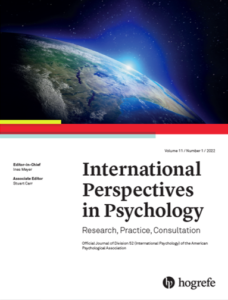
Fall 2023 – Volume 27, Issue 3
Table of Contents
Message from the President
Division News
- Division 52 APA 2023 Student Poster Contest
- Division 52 Council Rep Report
APA 2023 Convention Highlights
- Photos submitted by members
Global Perspectives
- Small International Exchange Offers Meaningful Insights
Member Activities
- Recent Member Publications
- Member Awards, Honors, & Accomplishments
United Nations Activities
- Global Support for Oppressed Psychologists
Early Career Professional Corner
- Convention Highlights and COP 28
Committee Highlights
- International Environmental Justice Committee
Webinars
International Perspectives in Psychology
Announcements and Opportunities
- 3-Day International Course for PhD Students
- Editor Search for Advances in Political Psychology
- CUGH-Hologic Global Women’s Health Grants
- ISPP Call for Conference Proposals
Artistic Expressions
- Uncertain Biologies by Gonzalo Bacigalupe
Note from the Editor
- APA 2023: Psychology plays a vital role in addressing global challenges
 Message from our President
Message from our President
Antonio Puente, PhD
Acuerdo de Asuncion/Asuncion Accord: Making 52 Relevant in the Americas
Division 52, International Psychology seeks to develop a psychological science and practice that is contextually informed, culturally inclusive, serves the public interest and promotes global perspectives within and outside of APA. Further, the mission of APA is to “Promote the advancement, communication and application of psychological science and knowledge to benefit society and improve lives”. The plan’s operating principles, or how APA will execute its strategic plan, has four principles of which one is to “Embrace a global perspective…to advance psychology globally through international engagement, association efforts, and meaningful collaborations”.
To interface of 52 and APA is organic by critical. In doing so, APA and global psychology interact, grows, and becomes relevant to all not just to a few and the privileged. It is my opinion that APA’s focus has long focused on the Global North, and particularly, Europe to ensure that this global interface occurs. However, there is so much more to psychology than Europe and those that represent nations that represent the current power structures of not only psychology but of nations and economies. APA and psychology have for far too long not emphasized the importance and value of psychology from the Global South but particularly from the America’s which, after all, is part of our home- not only geographically but culturally.
To begin to bridge “puentes” to all the Americas, delegations from APA and the Society for Interamerican Psychology (SIP) met at the 39th meeting of SIP held in Asuncion, Paraguay between 06.23 and 06.30.2023. The APA delegation was comprised by Jamie Diaz-Granados, Deputy Chief Executive Officer, Amanda Clinton, Senior Director for the APA’s Office of International Affairs, and me, as current President of our Division and 2017 President of APA while SIP’s delegation was comprised by its current President, Julio Cesar Penagos-Corzo, immediate past President, Alfonso Urzua, past President, Carlos Zalaquett, and incoming President, Viviane Pecanha. During that meeting a frank and open discussion was held discussing the history, limitations, and potential for a psychology of and for the Americas and how both APA and SIP could work collaboratively to ensure that a stronger, collaborative, and more representative psychology across all the Americas. General ideas as well as specific initiatives were discussed over the morning of Tuesday, June 27th. From those discussions a historic Memorandum of Understanding (MoU) was developed between SIP and Division 52. This was approved by the 52 Board of Directors at its meeting at APA on Wednesday, August 2, 2023, and subsequently signed by me and Carlos Zaloquett and Viviane Pecanha and witnessed by Jaime Diaz-Granados at the 52 Business Meeting of our Division on August 4th, 2023 at the APA Annual Convention in Washington, DC. The following is the Acuerdo de Asuncion/Asuncion Accord:
- Membership Costs:
Goal- to match APA and SIP membership costs.
Short term- use division 52 as a staging platform (by 2024).
- Language:
Goal- to have multiple languages, English and Spanish (possibly for Portuguese) presentations, workshops, publications, and certificates.
Short term- use 52 as a staging platform (by 2024).
- Memorandum of Understanding:
Goal- to expand the existence of the SIP/APA MoU by having the APA Division 52 International Psychology and SIP signs a similar MoU.
Short term- by the APA convention in 2023.
Note: The original MoU between APA and SIP was brokered by myself in 2017 and the SIP President at the time, Sandra Luna, and subsequently signed by the 2018 President of APA Jessica Henderson Daniel and Dra. Luna at the 2018 APA Convention in San Francisco, California. The Society for Interamerican Psychology was founded in 1951 to integrate psychology across the Americas.
Division 52 Poster Contest at APA2023: Washington DC
Lynette Bikos, Ph.D.
Each year, Division 52 hosts a poster contest at the APA convention. Over the years this contest has taken different forms. The purpose of the contest is about engagement in and celebration of international psychology. Nineteen posters were submitted. Poster entrees were reviewed (at least twice, each) and certificates were distributed at the convention by volunteers. Volunteers included: Judith Gibbons, PhD; Hyewon Yeo, MA; and Lynette Bikos, PhD.
Space prevents us from listing all contestants and winners, therefore we just list those who received first placings:
| Soojung Kang & Seoha Kim: Marginalized Clients’ Perceived Therapy Outcomes of Therapists’ Multicultural Orientation in Korea |
| Hanna Lim, Juhee Lim, Jinhee Yu, Yeahoon Jeong, Daeun Park, & Sungman Shin: Recovery Stage of People with Severe Mental Disorder in South Korea : The Latent Profile Analysis of People with SMD’s Recovery and Testing the Predictive Factor of Self-Determination |
| Hyewon Yeo & Seog Ju Kim: The Impact of Shift Work on Sleep Impairments and Depressive Symptoms in a Korean Sample at the High Risk for Bipolar Spectrum Disorder: The Multiple Regression Model Analysis |
| Gabriel Ezema, MA & Kelsey Autin, Ph.D.: Examining Predictors and Outcomes of Future Decent Work Perception among Nigerian Emerging Adults |
| Jin Yan, Vyas Sarabu, Luz Garcini: What Hurts Most: Trauma and Cardiometabolic Health of Undocumented Latino Immigrants in the U.S. |
| Yinan Liang, M.A.: The Personal Experience of “Zoom University” with Time Zone Differences |
| Baole Choi, Hwajin Cho, & Jinju Jo: Development and Effects of Flourish Program for College Students Based on Well-Being Theory |
| Soojung Kang, Kumlan Yu: Critical Incidents of Korean Supervisees’ Multicultural and Social Justice Counseling Supervision |
| Shirley Lo, Jude Bergkamp: The Experience of Colonization and Decolonization: A Case Study of the “Hong Konger” |
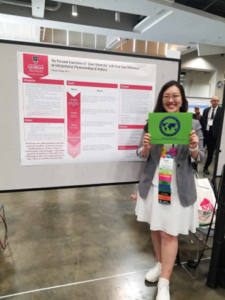
Division 52 Council Rep Report
Merry Bullock, Ph.D., Division 52 Representative to APA Council of Representatives
Following the August APA Council meeting (a report was sent to Division members via the listserv in August), Council activities have included an election for Board and Committee members (Division 52 VP for Engagement, Breeda McGrath, was elected to the Ethic Committee, and discussion in preparation for the next council gatherings in 2024.
Council members belong to a number of “caucuses” – interest groups of current and former council members that are organized to promote specific perspectives and issues. Most relevant to Division 52 is the Caucus to Promote Global and Global Human Rights Perspectives. This is a new caucus, begun just last year, but it has garnered a good number of members and is working on several initiatives. These include:
- issues relevant to international students, professionals and faculty – Caucus members met with Education Chief, Cathy Grus, to learn about APA’s advocacy for visa classifications for international psychology trainees, especially those doing post-docs and internships. The Caucus is also open to knowing more about the issues facing international psychologists that might be relevant for APA advocacy or guidelines.
- development of a resolution on APA responses to international armed conflict – the caucus is in the process of writing a resolution and welcomes Division 52 experts who will help think through how APA as an organization might respond to armed conflicts, and what kind of guidance might be useful to psychologists who are active in these situations.
- discussion of how to implement APA’s resolution on human rights which urges APA to incorporate human rights knowledge into psychology’s activities, including education and training.
- discussion of how APA might take action against global hate (expressed as anti-Semitism, xenophobia, racism, and conflict).
If Division 52 members have expertise in these areas, please contact D52 (APADiv52@gmail.com) if you would like to help on wording of council new business items or resolutions.
Update from the Coalition for Psychology in Schools and Education (CPSE)
Patricia H. A. Perez, PhD: Adjunct Faculty, Department of Psychology, Adler University<Division 52 Representative
The Coalition for Psychology in Schools and Education (CPSE) includes members who represent various APA divisions. I am pleased to be the Division 52 representative since December 2019. CPSE’s mission “is to bring together interested psychologists to promote and make publicly accessible applications of the research that psychology has developed to assist the nation in improving the quality of public and private pre-K to 12 education” (https://www.apa.org/ed/schools/coalition).
As a group, our meetings are semi-annual (June and December). Our last meeting was held on June 2-4 in Washington, DC.
Please see the projects I have participated in as a representative of Division 52.
- Mental Health Primers-This working group was launched in 2018. These primers assist teachers with relevant research and strategies for addressing mental health issues of their students. With funding from CDC, we finalized these primers to be included for teachers’ professional development focused on racial and ethnic disparities. We continue to work on audio recordings with relevant content that accompany each primer.
- Top 20 Principles From Psychology for PreK-12 Teaching and Learning of Students with Disabilities-APA announced the completion of this report (see full report at end of the announcement below) as of July 2023. I am one of the lead authors for this report.
- Top 10 Principles: Family Companion-This working group was created in June 2022 to develop a report that focuses on principles that loosely follow the Top 20 Principles on PreK-12 for Teaching and Learning. The Top 10 Principles will be used as a companion report for parents, family, and caregivers in support of their child in academic settings, within the home, and across their communities. Anticipation completion and publication in 2024.
- Promoting Mental Health and Academic Success: Leveraging Lessons From the COVID-19 Pandemic-This working group was created in June 2021 to address lessons learned for teachers, family, leadership, and students during the COVID-19 pandemic. Five areas were highlighted in this report: 1) Community Outreach, 2) Instruction, 3) Mental Health and Well-being (lead author), 4) Promoting Science-based Information, and 5) Technology. This report is targeted to be published in 2023.
Our next meeting is scheduled virtually on December 1-3. If you are interested in learning more about CPSE and our work, please feel free to contact me at pperez@adler.edu.
Photos submitted by members
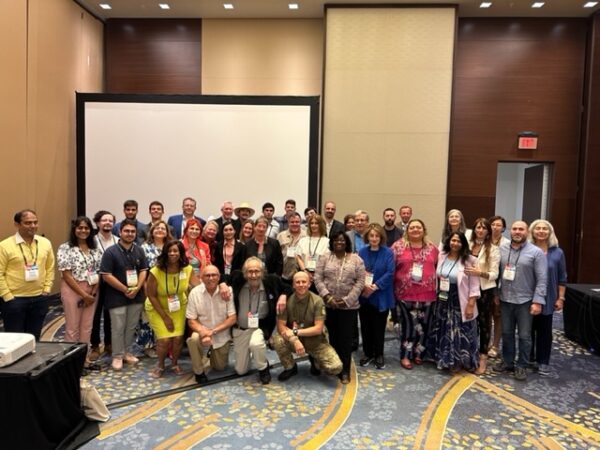
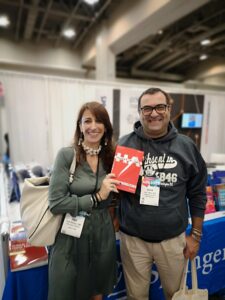
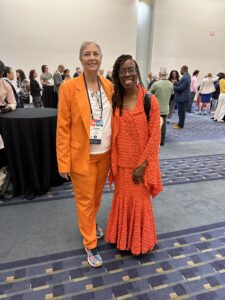
Small International Exchange Offers Meaningful Insights
Aluel Ayok-Loewenberg, B.Sc., London, UK and Seoul, South Korea
Dana R. Falk, Ph.D., Licensed Psychologist, Independent practice in Seattle, WA, USA
Formal international collaboration is a superb opportunity. Exchange across cultures enables us to contemplate how Psychology is regarded and how treatment is accessed. The authors assert that even small, informal international exchanges can be quite illuminating.
The first author was raised in Switzerland, Egypt, and England. She has relatives in South Sudan and is a songwriter in South Korea. The second author has learned from Fulbright collaborations in Taiwan and Indonesia and from a research collaboration in Argentina. Together, we share personal stories of international exchanges that provided us insights.
SMALL OPPORTUNITIES FOR A MORE GLOBAL PERSPECTIVE
(1) A 25-year-old friend in Seoul, South Korea told me she struggled with depression and suicidal ideation. After pleading with her family, they allowed her to seek professional counselling, but thy kept this a secret. The friend was diagnosed with Major Depression and she received psychotherapy and antidepressants. Her family’s opposition to treatment changed only when they witnessed improvement. The father later explained that a mental health diagnosis on her record could mean employment discrimination in South Korea. This helped me understand that protecting her was part of his reason for denying her treatment at first.
(2) A friend in Juba, South Sudan described how her father had begun exhibiting erratic behaviour. He denied feeling trauma and refused professional support. Stigma against mental illness is particularly strong in S. Sudan, she said; often symptoms are attributed to past sins or to a curse from God. South Sudan has experienced multiple, brutal wars, leaving many people affected and I now realised that anywhere people live with decades of war, generational trauma is the norm. My friend’s father believed it futile to admit distress without some practical solution. His perspective, I learned, was “I experienced trauma, but so did everyone. Why discuss it?”
(3) In Cañuelas, Argentina I interviewed Psychodynamic therapists about living in a culture that is fluid about time but working with a theoretical orientation that is structured about time. Therapists shared that they did not feel conflicted: they utilize time as a boundary in dynamic therapy but relax that structure in their personal lives. This helped me appreciate how adaptive it is to navigate “a culture within a culture.”
(4) In Yogyakarta, Indonesia I was to help people cope with traumatic loss from natural disasters such as tsunamis. Many resdients were unaware of PTSD and of distressing symptoms such as flashbacks. We discussed what the brain does when it’s overwhelmed. Often, the relief was visible. This highlighted for me psycho-education as a form of empathy.
(5) I was teaching suicide prevention to Counseling trainees in Taipei, Taiwan when the students taught me something interesting. Students revealed that they tell their parents “I’m becoming a teacher.” (A clever work-around, as they were in the College of Education.) A great reminder how labelling can matter and how game we are all for acceptance.
International relationships, even brief ones, enrich our lives and enhance our professional development. Keen observation, brave questions and a humble, curious mind provide us a more global understanding of attitudes towards Psychology.
Aluel Ayok-Loewenberg, B.Sc. speaks English, German and Korean. Aluel hopes to become a Psychologist and will apply to Psy.D. programs in the UK.
Dana Falk, Ph.D. invites international exchange with Psychologists beyond North America. Dana is able to host a few colleagues or grad students in Seattle.
The German translation of this article can be be found here:
Internationaler Austausch im kleinen Rahmen bietet
aufschlussreiche Einblicke
Recent Member Publications
Humanity in Psychology: The Intellectual Legacy of Pina Boggi Cavallo. Edited by Pina Marsico & Luca Tateo. Springer 2023, https://link.springer.com/book/10.1007/978-3-031-30640-2
The book is relevant for International Psychology because it shows a form of international intellectual collaboration between scholars across countries and historical periods. It presents a new-old way of interpreting psychological sciences applied to crucial issues such as women in science, natural disasters, aging, relationship between research and practice.
Claudia Zuniga and Merry Bullock recently completed an open access special issue on Internationalization in Psychology for Trends in Psychology. The editor’s introduction is titled: “Internationalization of Psychology: Indicators, Challenges, Benefits and Risks.” You can see the special issue here: https://link.springer.com/
Member Awards, Honors, & Accomplishments
APA 2023 Convention Awards
Nancy Sidun, Ph.D. was awarded an APA Presidential Citation
Martha Zlokovich, Ph.D. was awarded an APA Presidential Citation
Erinn C. Cameron, Ph.D. was awarded the NIDRA-13 Early Career Research Award for her dissertation work regarding stigma, female identity, and cannabis use for chronic pain in women.
Patrick Robertson & Erinn C. Cameron, Ph.D. were awarded the Division 56 Trauma Psychology 2023 Outstanding Poster Award for their work on gender and trauma during the COVID-19 pandemic in Ghana.
Other Awards, Honors, & Accomplishments
Breeda McGrath, Ph.D. was elected to the APA Ethics Committee
Yu-Wei Wang, Ph.D. was granted Fellow status in APA Division 17
Erinn C. Cameron, Ph.D. was awarded the 2023 Dr. Sally Peterson Research Excellence Award for her first-authored paper “Cameron E.C., Ray, J.M., Trend-Cunningham, F. J., & Jacquin, K.M. (2022). Female incarceration rates and violence against women predict estimated prevalence of modern slavery. Trends in Psychology. https://doi.org/10.1007/s43076-022-00239-7″
Dr. Patricia Perez and Mr. Brandon Kerr presented at the 6th Annual Middle East Psychological Association Conference and Expo in Kuwait (March 9-11, 2023). “Considerations and Strategies for the Mental Health and Well-Being of Third Culture Kids/Adults (TCK/A).”
Global Support for Oppressed Psychologists
Tara Pir, Harold Takooshian, Elaine Congress
How can we psychologists best support our colleagues in oppressed nations?
Since the Psychology Coalition at the United Nations (PCUN) was formed on September 20, 2012, it is now a coalition of 10 non-governmental organizations (NGOs) that apply psychological science to timely global issues. One of these is the Institute for Multicultural Counseling and Education Services. Since IMCES was formed in Los Angeles in 1989, it has been a pioneer in developing ways to promote global understanding across people of diverse cultures.
As always, many of the 193 nations in the United Nations today are oppressed—with autocratic governments that restrict their psychologists and other citizens. Psychologists in democratic nations naturally feel powerless to assist their oppressed colleagues. One example of this is a recent statement by the Society for Psychological Study of Social Issues (SPSSI), urging solidarity with the people of Iran.[1] In 2023, IMCES developed a more general “Resolution on global solidarity with oppressed psychologists,” which appears below,[2] and is now endorsed by several NGOs in PCUN. For any comments or questions, contact IMCES Director Tara Pir at drpir@imces.org .
[1] SPSSI: https://psychologycoalitionun.org/pcun-statement-on-iran/
[2] IMCES: www.imces.org/docs/Resolution_on_Global_Solidarity.pdf
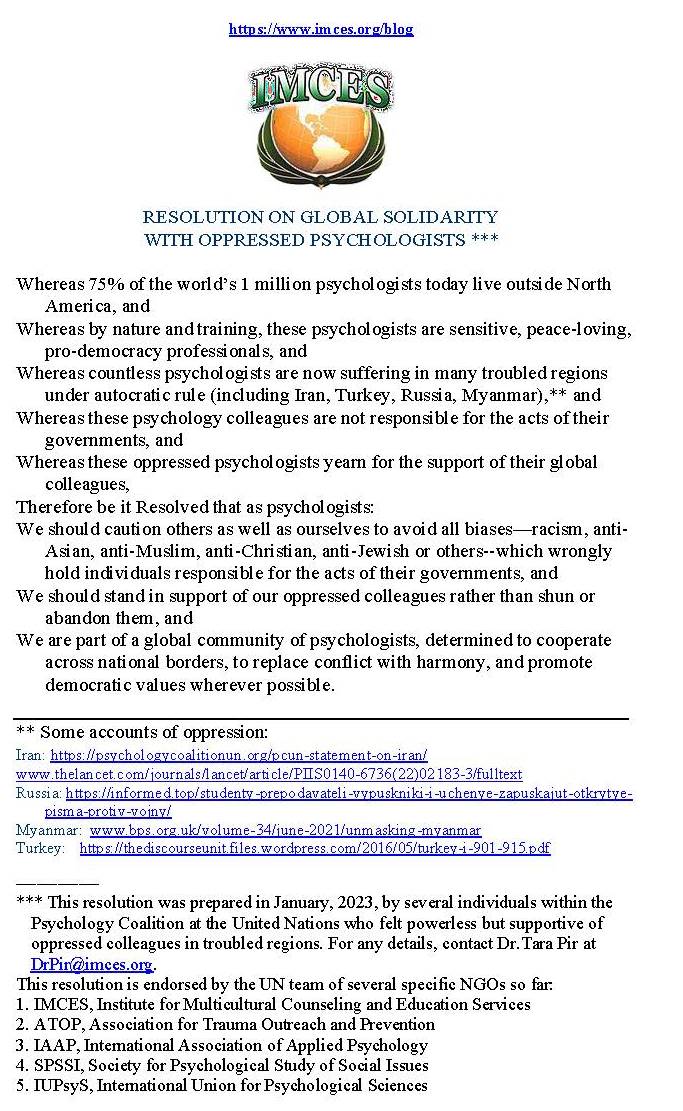
Convention Highlights and COP 28
This year’s convention in Washington D.C. was an excellent opportunity for engagement and learning. Division 52 hosted many of the events and opportunities for connection with fellow ECPs, students, and seasoned professionals who have a passion for global psychology. Some of the key pressing issues globally were discussed pertaining to climate change, globalization, intergroup conflict, migration, refugees, poverty, emphasis on indigenous people and inclusion, mental healthcare disparities and inequities, and a framing around the critical role international psychology plays in achieving the Sustainable Development Goals. There is much to move forward with as we embark on preparations for 2024, including how our international psychology division members are pivoting center stage on issues pertaining to climate threat to mental health, and mental health determinants at COP 28, scheduled to convene from 30 November to 12 December 2023 in Dubai, United Arab Emirates. Check out https://www.cop28.com/en/.
The energy and impact of Division 52 are palpable. We take this opportunity to share some photos from the convention below! We are looking forward to finishing out 2023 strong with additional opportunities for ECPs with a social hour, information on COP 28, and more. Please stay tuned for communications on our plans.
Please reach out to us any time for connection or ways to get involved as an ECP! We are always looking for additional ideas, support, and engagement:
ECP Past Chair, Dr. Lora Erickson, LErickson@thechicagoschool.edu
ECP Chair, Dr. Tatyana El Kour, tatyana.elkour@gmail.com
ECP Chair Elect, Dr. Rawan Atari-Khan, rawan.atari-khan@marquette.edu
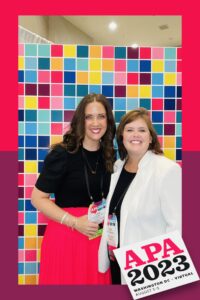
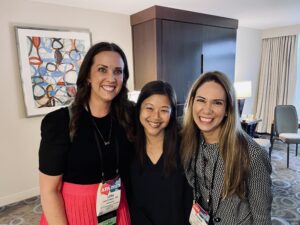
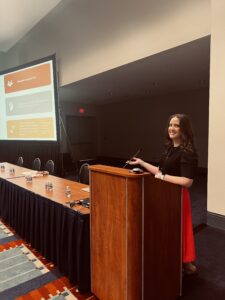
International Environmental Justice Committee (IEJC)
Erinn C. Cameron, Ph.D.
Division 52’s International Environmental Justice Committee (IEJC) is very active. IEJC hosts monthly meetings and international webinars, publishes on climate justice topics, presents symposia, and is currently organizing a special issue on environmental justice for IPP. Here are some recent highlights:
During the APA convention, IEJC sponsored two important events. The first was a breakfast cohosted by IEJC and International Perspective in Psychology Associate Editor Joy Mendiola Teng-Calleja. Participants were able to discuss the IEJC current special issue: “Environmental Justice and Psychology: Alternative Ideas on Environmental Issues.” Participants also learned about publishing in our division’s journal, including how to submit manuscripts, and how the review process works. For questions about publishing in IPP, please reach out to editors:
Ines Meyer ines.meyer@uct.ac.za
Mendiola Teng-Calleja mcalleja@ateneo.edu
IEJC, in collaboration with Division 34 (Environmental Psychology) also presented a symposium panel at APA 2023 titled “Towards a new way of understanding and promoting international environmental justice in psychology.” Presentations questioned international psychology’s concepts, ethics, and methods in relation to environmental justice and cooperation. Speakers also engaged the audience in a discussion about the APA Climate Crisis Action plan beyond the current Global North’s framework. Presenters included Gonzalo Bacigalupe, Erinn C. Cameron, Mike Campbell, Camila Perez, Derrick Sebree, & Natalie Greaves. Topics included localized environmental education practices in Chile, ethics and practicality in Caribbean climate threat research, an ecofeminist analysis of climate change, and the concept of “good living” or küme mongen.
If you would like to be involved with the IEJC and their exciting, groundbreaking international climate justice work, please reach out to: Luca Tateo, IEJC Chair, lucatateo@gmail.com.
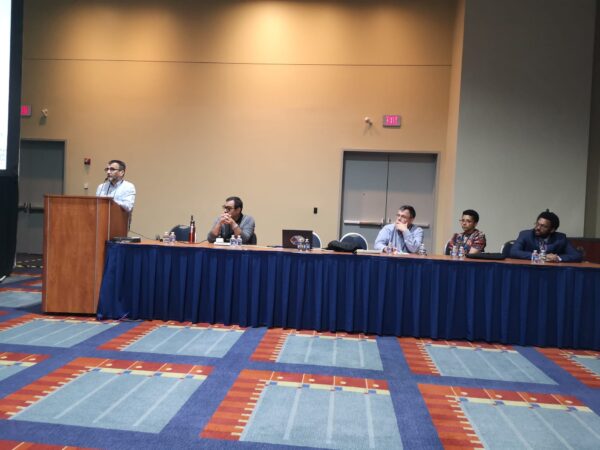
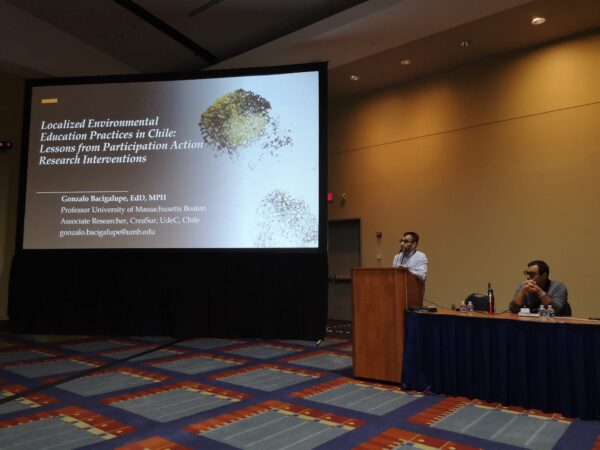
Division 52 Webinar Committee Chair: Luca Tateo, Ph.D.
Division 52 Webinars are hour-long informational and skill-building sessions. They are open to the public, and there is an opportunity for discussion with the presenter. If you would like to suggest a webinar topic, please reach out to Luca Tateo, lucatateo@gmail.com
Dear colleagues,
I am writing this message in agreement with the presidential trio to greet you all at the end of my 3-years duty as chair of the Webinar Committee. Thanks to the hard work of Pina Marsico as former co-chair; to the efforts of Karen, Merry, Daniel, Falu, and all the speakers; and thanks to the incredible number of attendees.
During the last 3 years, the webinar committee organized 2 thematic series, and a total of 28 webinars with hundreds of participants each time. All the recordings are available on our webpage https://div52.net/webinars/ together with the older archives.
It is now time to invite members to serve in the new cycle. We need at least 3 members to keep up with the workload. I will continue to work on the transition until the end of 2023. If any members are interested in joining the webinar committee, please contact me or the presidential trio.
International Perspectives in Psychology: Research, Practice and Consultation
Ines Meyer, School of Management Studies, University of Cape Town, South Africa
Mendiola (Joy)Teng-Calleja, Ateneo de Manila University, Quezon City, Philippines
Current Issue:
International Perspectives in Psychology for Sustainable Life with Special Section: Building an Equitable Global Psychology – Giving Voice to Indigenous Psychology in Southeast Asia Articles (https://econtent.hogrefe.com/toc/ipp/current).
3-Day International Course for PhD Students
PhD course “Theorizing subjectivities, ecological concerns, and everyday practices” Department of People and Technology, Roskilde University, Denmark. External lecturers include: Nora Räthzel (Department of Sociology, Umeå University), Luca Tateo (Department of Special Needs Education, University of Oslo) and Jacob Klitmøller (Department of Psychology and Behavioural Sciences, Aarhus University).
The course will close with a multi-disciplinary roundtable discussion that includes further colleagues as well as practitioners/activists. Registration will open on Aug. 28, 2023. Details for registering: https://study.ruc.dk/class/view/33669
Course description:
This 3-day course invites international PhD students from all disciplines to consider the societal-ecological relevance of their intended conceptual developments, with a focus on how these may have an impact on citizens’ daily lives. Emphasis is put on the projects’ theoretical innovation potentials and their concrete challenges with making such innovation relevant to the research project participants, collaboration partners, civil society, politicians, or more generally: to the broader ecology. Even though emphasis is put on research projects’ theoretical challenges, all projects – also those with a strong emphasis on empirical material – are welcome.
Search for New Editor for Advances in Political Psychology
Advances in Political Psychology (see http://www.ispp.org/news/Advances) is looking for a new editor. The new editor will serve for 5 years starting August 1, 2024, immediately after the current editors’ term expires July 31, 2024. The editor will be approved by the ISPP Governing Council in January 2024. The transition from the current to the new editor will start in February 2024. A short description of Advances is below. For more information about the editorial position and duties, please contact the current editors (Stephen P. Nicholson, snicholson@uga.edu, and Efrén O. Pérez, perezeo@ucla.edu). For questions about the search process, contact the search committee Chair (Tali Mendelberg talim@princeton.edu). To apply, please email your CV and a proposal that discusses your motivation, previous editing experience, areas of expertise and familiarity with political psychology (and its various disciplinary homes), and vision for Advances. This vision should include your plans for how to maintain high quality and increase the disciplinary, thematic, and regional/cultural diversity of the journal, and any other ideas for innovation and increasing the readership. Please send applications to the committee Chair by October 15, 2023, to talim@princeton.edu.
CUGH-Hologic Global Women’s Health Grant Program
ISPP Call for Conference Proposals
The International Society for Political Psychology is now accepting submissions for the 47th ISPP Annual Meeting, taking place July 4 – July 6, 2024, in Santiago, Chile. The submission portals will be open through 15 November 2023 for paper, poster presentations, panels, and roundtables.
Conference Theme: Dismantling Democracy: Insecurity, emotions and authoritarian populism
More information can be found at the conference website: https://ispp.eventsair.com/ispp-2024-annual-meeting/
Call for translators: APA Division of International Psychology
Maria Elisa Vannoni & Harold Takooshian
“What is the history of APA Division 52, International Psychology?”
Formed in 1997, Division 52 marked its 25th anniversary in 2022. This two-part article shares good news, and a special invitation to psychologists outside North America to actively participate in Division 52.
- Beyond-English. The Division 52 website now offers a concise one-page history of Division 52 in over 30 languages.[1] Each of these has the name of the indigenous author who kindly translated this history, to make this accessible to people in their region, from Amharic to Urdu.[2] Since our call for translators appeared in the spring, 2023, issue of the International Psychology Bulletin, 7 experts kindly agreed to translate this history:
Catalan (Sarah Camara)
Esperanto (Humphrey Tonkin, University of Hartford)
Georgian (Lizi Lomtadze, Fordham University)
Hausa (Fatima Yusuf Tumsu, ATBU Bauchi)
Portuguese (Marília Mallmann Parreira, Dall’Agnol, Brasil)
Punjabi (Jaspal Singh, Punjab School Education Board)
Tagalog (Richard S. Velayo, Pace University)
- Invitation. Can you translate this page into another language, listing yourself as its author/translator? If so, Maria Vannoni offers a list of 39 new languages (from Afrikaans to Zulu), including the estimated millions of people who use that language.[3] She now seeks psychology colleagues and students who can volunteer to prepare a one-page translation, in 3 steps: (1) Contact Vannoni to pick a new language, and receive the current English-language original. (2) Upon approval, translate and submit your page within 4 weeks, in PDF and MSWord format, naming yourself as its translator/ author. (3) Once this is posted, feel free to post or circulate this widely among compatriots.
For any details, or to volunteer, contact Maria Vannoni soon: me.vannoni@gmail.com
[1] Webpage: https://div52.net/about/history-of-division-52/a-brief-history-of-division-52-english-and-translations/
[2] Current 40 languages: Amharic, Arabic, Armenian, Bengali, Catalan, Chinese-Mandarin, Chinese-Traditional, Dutch, English, Esperanto, Estonian, Farsi, Finnish, French, Georgian, German, Greek, Hausa, Hebrew, Hindi, Hungarian, Indonesian, Italian, Japanese, Kinyarwanda (Rwanda), Korean, Latvian, Malaysian, Maltese, Norwegian, Polish, Portuguese, Russian, Sinhalese, Somali, Spanish, Tagalog, Thai, Ukrainian, Urdu.
[3] 39 future languages: Afrikaans (7 million), Albanian (16), Basque (1), Belarusan (3), Bosnian (3), Bulgarian (8), Cambodian (14), Croatian (5), Czech (10), Danish (16), Galician (2), Gujarati (46), Haitian Creole (7), Hawaiian (.02), Icelandic (0.3), Irish (0.1), Javanese (84), Kannada (37), Khmer (14), Lao (3), Lithuanian (3), Macedonian (2), Marathi (72), Mongolian (6), Nepali (16), Punjabi (63), Romanian (23), Serbian (15), Slovak (5), Swahili (150), Swedish (9), Tamil (69), Telugu (74), Tibetan (8), Turkish (71), Vietnamese (68), Welsh (0.7), Yiddish (1), Zulu (12)
Uncertain Biologies by Gonzalo Bacigalupe
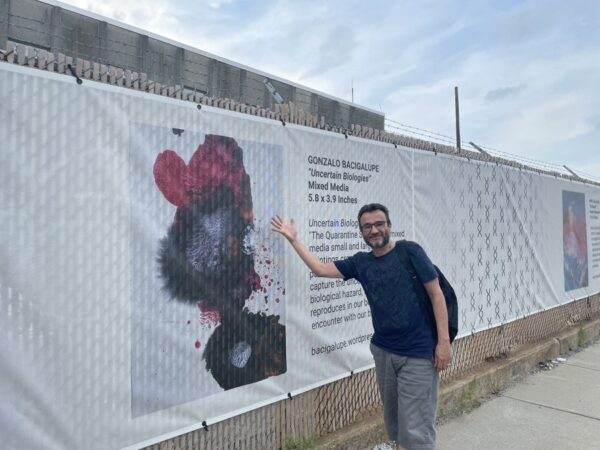 Division 52 member Gonzalo Bacigalupe’s artistic piece Uncertain Biologies is part of the Quarantine Series, a hundred mixed media small and large format paintings that Gonzalo created during the pandemic quarantine. It intends to capture the uncertain path of a biological hazard, a particle that reproduces in our bodies in an encounter with our biographies. Uncertain Biologies is on display at the Art Lives Here public art event in Somerville, Massachusetts, through April 2024. This project features the works of 22 neighborhood artists from Joy Street Studios and the Brickbottom Artist Association conveying how the area’s artistic community and art-making spaces foster a vital sense of place within the Brickbottom District. If you are in the greater Boston area, come check out this amazing artwork. Narrative of the event by the city of Somerville: https://www.somervillema.gov/
Division 52 member Gonzalo Bacigalupe’s artistic piece Uncertain Biologies is part of the Quarantine Series, a hundred mixed media small and large format paintings that Gonzalo created during the pandemic quarantine. It intends to capture the uncertain path of a biological hazard, a particle that reproduces in our bodies in an encounter with our biographies. Uncertain Biologies is on display at the Art Lives Here public art event in Somerville, Massachusetts, through April 2024. This project features the works of 22 neighborhood artists from Joy Street Studios and the Brickbottom Artist Association conveying how the area’s artistic community and art-making spaces foster a vital sense of place within the Brickbottom District. If you are in the greater Boston area, come check out this amazing artwork. Narrative of the event by the city of Somerville: https://www.somervillema.gov/
More of Gonzalo’s work can be found on his Instagram and his personal website:
https://bacigalupe.wordpress.com/
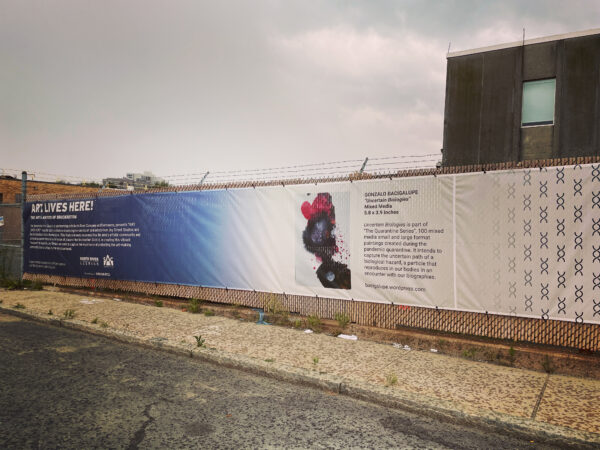

Dear Colleagues,
Welcome to the Fall issue of the International Psychology Bulletin. I want to extend a warm greeting to our members, both new and old, and invite you to contribute to this space. Most recently, many of us were able to come together at the APA 2023 annual convention in Washington, D.C. The convention reminded us that the world is facing several complex challenges, and psychology has a vital role in helping us address them. From the ongoing COVID-19 pandemic to the war in Ukraine to the climate crisis, these challenges are having a significant impact on global mental health and well-being. During the convention, we heard from many psychologists who are working on the front lines of these challenges, providing support to individuals, families, and communities. These individuals are also conducting research to understand better the psychological impact of these events, which can then inform the development of effective evidence-based interventions and governmental and institutional policies.
I want to highlight a few specific areas we heard about during the APA 2023 convention in which psychology is making a difference in the global community.
Supporting refugees and displaced people. The war in Ukraine has created a humanitarian crisis, with millions of people displaced from their homes. Psychologists are providing support to refugees and displaced people in a variety of ways, including trauma-informed therapy, mental health services, social support programs, and advocating for human rights.
Promoting mental health and well-being in the workplace. The COVID-19 pandemic has led to significant changes in the way we work. Many people are now working remotely, and others are facing increased workloads and stress. Psychologists are working with employers to develop programs and policies that promote mental health and well-being in the workplace.
Addressing the psychological impact of climate change. The climate crisis is a major source of stress and anxiety for many people. Psychologists are working to help people cope with the psychological impact of climate change, to develop strategies for resilience, and advocate for social and environmental justice.
These are just a few examples of the many ways in which psychology is making a difference internationally.
I would like to encourage all of you to get involved in the global psychology community. Please contact any of the Division 52 board members or committee chairs for more information on how to get involved. You can also find more information on the Division 52 website: https://div52.net/
Please email questions, comments, or suggestions to ipbdiv52@gmail.com. The deadline for submissions for the winter issue is December 15th, 2023.

